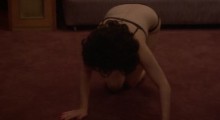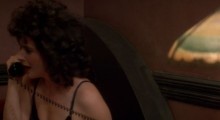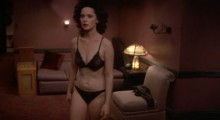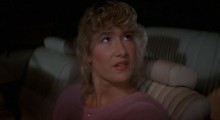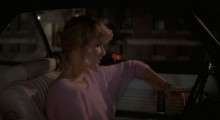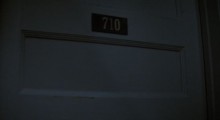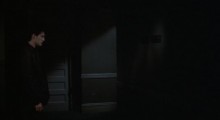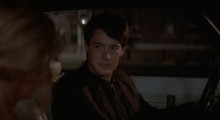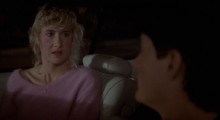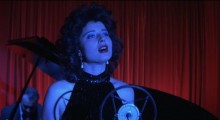The Blue Velvet Project
-
The Blue Velvet Project, #47

Second #2209, 36:49 The seconds tick down. Dorothy crawls, in anguish across the floor, coming dangerously close to the closet that hides Jeffrey. She is abject, and also strangely free, the sort of freedom that comes from knowing that the worst is yet to happen, yet again. The sharp expectation of pain that gives life meaning, but that can also carve out what was best in you and wound and warp it forever. It is like a scene from a silent movie, as Dorothy’s body conveys a meaning beyond words. Isabella Rossellini is the star of a hidden drama within […]
by Nicholas Rombes on Nov 28, 2011 -
The Blue Velvet Project, #46

Second #2162, 36:02 “Frank? Frank! What’s the matter with him?” Dorothy pleads on the phone about her kidnapped husband and son, Don and “little Donny.” There are facts, and there are facts of the frame: 1. This shot of Dorothy completely breaks with Jeffrey’s implied point-of view from the closet. 2. Dorothy is a woman in trouble. 3. This is the first instance of Frank in the film, invisible over the phone line, somewhere else, an implied presence and absence at the same time. 4. Dorothy’s maternal vulnerability, the fact of it, and the way that Jeffrey will sense and […]
by Nicholas Rombes on Nov 23, 2011 -
The Blue Velvet Project, #45

Second #2115, 35:15 Jeffrey, startled by Dorothy’s return, hides in the closet. She undresses, and comes toward the closet and, just as Jeffrey is about to be discovered, the phone rings. It has not rung yet at the moment of this frame, which captures Jeffrey’s fantasy-dream at its edges: what are the chances that the woman of his dreams would strip to her underwear and approach him? The angle of vision is not directly from Jeffrey’s point of view, slightly dissociating us from his gaze. But that phone ring, as if dialed in from the stock sounds of classic Hollywood […]
by Nicholas Rombes on Nov 21, 2011 -
The Blue Velvet Project, #44

Second #2068, 34:28 “I hope you’re careful, Jeffrey,” Sandy whispers to herself, gazing up at Dorothy’s apartment, where Jeffrey has just not-heard her car horn warning because—and there is a strange, haunted reference to Psycho somewhere in this scene—he is in Dorothy’s bathroom and has just flushed the toilet. Laura Dern’s face is made-up in a way that hearkens back to her role in 1982’s Ladies and Gentlemen the Fabulous Stains, a film which teetered so delicately between the sweet danger of punk and the even sweeter danger of new wave pop that it practically imploded. Lines upon lines could […]
by Nicholas Rombes on Nov 18, 2011 -
The Blue Velvet Project, #43

Second #2021, 33:41 The tension in this sequence—as Jeffrey sneaks around alone in Dorothy’s apartment while half-listening for Sandy’s warning car horn—is sustained by carefully modulated shifts in what we as the audience know in comparison to what Jeffrey knows. While our knowledge of what is happening sometimes equals Jeffrey’s (those moments when we know nothing more or less than he does), at other times we are suddenly thrust ahead of his limited omniscience. In the previous scene, as Jeffrey explores the darkness of Dorothy’s apartment, we know what he knows, and nothing more. But once the film cuts to […]
by Nicholas Rombes on Nov 16, 2011 -
The Blue Velvet Project, #42

Second #1974, 32:54 What does it mean to speak of the cinematic image in the age of cinematic images? This frame, captured from the 2002 DVD edition of Blue Velvet, isn’t really even a frame; its relationship to the 35 mm source film is ambiguously fraught with the complications of digital coding. For one thing, if the film has been MPEG-2 compressed, what has been lost? The information in the frame leaks in and out, depending on our viewing medium of choice, so that we experience the digital image not so much through presence, but through absence. Spatial and temporal […]
by Nicholas Rombes on Nov 14, 2011 -
The Blue Velvet Project, #41

Second #1927, 32:07 Jeffrey and Sandy have agreed on four honks of the car horn: this will warn Jeffrey to leave Dorothy’s apartment. Sandy waits in the car outside, in the night, in her own cocoon of nervous electricity. This is when Blue Velvet begins to go very, very dark, as Jeffrey makes his way through the India Ink of the screen into ever deeper and deeper blackness in what are perhaps the most psychologically violent moments in the film. Where has Blue Velvet taken you? When he woke up he thought he’d dreamed about a movie he’d seen the […]
by Nicholas Rombes on Nov 11, 2011 -
The Blue Velvet Project, #40: A Plea For Less

Second #1880, 31:20 A PLEA FOR LESS [This version of the Blue Velvet Project is published on the occasion of Blue Velvet‘s release on Blu-ray with deleted scenes on November 8th.] There are probably many more good and sound reasons to make available Blue Velvet’s deleted scenes than not—I’ll concede that right from the beginning. For one thing, Lynch thankfully decided not to re-cut the film with the new scenes; this is not a “director’s cut.” Since Lynch was under contract to deliver a two-hour cut in 1986, it would make sense that the scenes (part of a longer, nearly […]
by Nicholas Rombes on Nov 9, 2011 -
The Blue Velvet Project, #39

Second #1833, 30:33 1. Jeffrey: Can you drive this car? Sandy: Yeah, but . . . Jeffrey: Leave it in front of my house for me, okay? 2. In Haruki Murakami’s novel IQ84, a group of characters discuss the implications of an act they have committed: You throw a stone into a deep pond. Splash. The sound is big, and it reverberates around the surrounding area. What comes out of the pond after that? All we can do is stare at the pond, holding our breath. 3. One month after Blue Velvet’s U.S. release, another David’s movie was released, David […]
by Nicholas Rombes on Nov 7, 2011 -
The Blue Velvet Project, #38

#1784, 29:46 In what is perhaps Haruki Murakami’s best, most neglected novel, South of the Border, West of the Sun, the narrator recalls the effects of listening to a recording of a Liszt piano concerto: And the music itself was wonderful. At first it struck me as exaggerated, artificial, even incomprehensible. Little by little, though, with repeated listenings, a vague image formed in my mind—an image that had meaning. When I closed my eyes and concentrated, the music came to me as a series of whirlpools. One whirlpool would form, and out of it another would take shape. . . […]
by Nicholas Rombes on Nov 4, 2011
